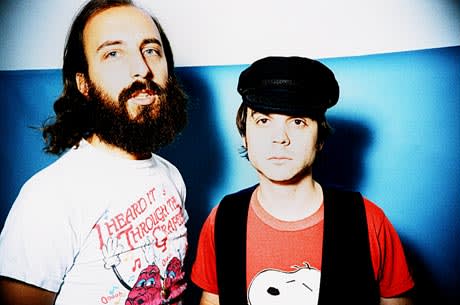Even within their conflation of silly wordplay, genuine sentiment and folk pop sounds from a bygone era, Pariss Herman Dune write irresistible love songs with enviable consistency. After a series of sunny, off-kilter EPs, Next Year in Zion retains the bands knack for thoughtful, multi-layered pop arrangements, acknowledging the empowering optimism of early 60s folk, bolstered by the subtle abrasiveness found in smiling-on-the-outside Motown. Shining down upon this dreamy melange, Jonathan Richman and the Velvet Underground are guides but their work is processed from a distance with foreign innocence the band emulate their American heroes. Of the many gems, "An Afternoon Dance Party perfectly encapsulates Herman Dunes unique take on contemporary song forms. A sly nod to Dylans "4th Time Around, the song is typical for David-Ivar Herman Dune a narrative documenting a pushy romantic pursuit but his jarring references to having his ass dumped and "Beyoncé and Jay-Zed are endearingly colloquial and strange. The omnipresent female back-up vocalists, propulsive yet understated percussion and language experiments give songs like "My Home is Nowhere Without You the romantic grace that makes Next Year in Zion a brash, timeless success.
What distinguishes one Herman Dune record from the next?
David-Ivar: For me, every album has been totally different from the one before. We try to think of them as "the first one every time and if someone listens to this record theyd have no need of knowing the previous ones to get into our music.
Why do relationships interest you?
When youre fascinated by something you cant really explain why you feel like talking about something that you cant really control. Its something I felt close to and then became fluent at and where Ive felt the closest to something really personal is writing about relationships between two people.
Are particular musical eras important to you?
I listen to music mainly from the 1950s, 60s and early 70s. The sound of it and the time people spent writing songs, caring about lyrics, are what I like in music. Its like looking at a toy in a window and wanting to play with it; you hear horn arrangements or percussion and you want to try them yourself. Its not total inspiration, in terms of personal songwriting, but when it comes to arrangements and production, I find it great to have mentors.
(Everloving)What distinguishes one Herman Dune record from the next?
David-Ivar: For me, every album has been totally different from the one before. We try to think of them as "the first one every time and if someone listens to this record theyd have no need of knowing the previous ones to get into our music.
Why do relationships interest you?
When youre fascinated by something you cant really explain why you feel like talking about something that you cant really control. Its something I felt close to and then became fluent at and where Ive felt the closest to something really personal is writing about relationships between two people.
Are particular musical eras important to you?
I listen to music mainly from the 1950s, 60s and early 70s. The sound of it and the time people spent writing songs, caring about lyrics, are what I like in music. Its like looking at a toy in a window and wanting to play with it; you hear horn arrangements or percussion and you want to try them yourself. Its not total inspiration, in terms of personal songwriting, but when it comes to arrangements and production, I find it great to have mentors.




